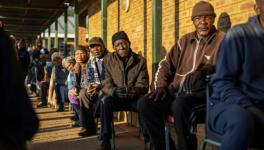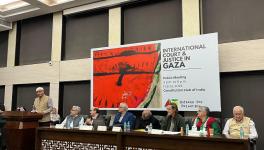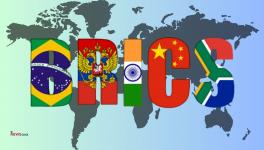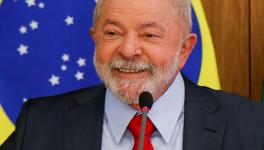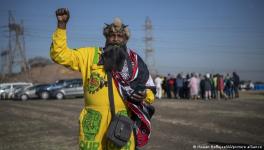Complex Situation in South Africa
Newsclick speaks to Professor David Sanders from the University of the Western Cape in South Africa about the political situation and the situation that progressive movements in South Africa find themselves in. Professor Sanders feels that South Africa's situation today is extremely complex and difficult. He says there's a huge vacuum to the left of the ANC in policy, and therefore, there is an urgent need for an independent, progressive political movement to the left of the ANC, that is not attached to the ANC and which will necessarily be built from the civil society and most importantly the mass organisations like the trade union.

Amit Sengupta (AS): Hello and welcome to Newsclick. We are in conversation with David Sanders from the University of Western Cape in South Africa. Someone who has also been quite integrally involved in the liberation struggles of both Zimbabwe and South Africa and we are talking to Prof Sanders today about the political situation and the situation that progressive movements find themselves in, in South Africa. David, thank you for being with us.
David Sanders (DS): Pleasure
AS: And, the first question that comes to a lot of people's minds who follow the inspiring struggle against apartheid in South Africa is that 2 decades after apartheid, many people – both within South Africa and those outside who know about what's happening there, seem a bit disillusioned about what the situation is now. So, what is your take on that?
DS: Yes, I think South Africa's situation is extremely complex and difficult. There are many factors. South Africa achieved liberation, in a way, at a very inopportune time. In the early 1990s, neo-liberal capitalism was at its height. Unlike, by the way, Zimbabwe, where I come from originally where at that time there was still a hope that a new International Economic Order - IEO, global social democracy could be attained and of course, there was still the Cold War – just ending. So, South Africa attained its independence at that time. But really, I suppose the internal factors are also extremely important. South African National Congress which came to lead the liberation movement, and by the way, the liberation movement did not consist only of the ANC, there were other formations, who increasingly complained that they have been marginalised since the early 90s. So, the ANC headed the liberation movement and in the early 90s, during the transition, again unlike the situation in Zimbabwe, unfortunately the mass struggle, had been largely demobilised, mostly through force. So, the United Democratic Front, which the ANC claimed as its internal movement, although it was lot more spontaneous than that, the UDF, really peaked in the mid to late 1980s and was brutally crushed by the apartheid forces. So, when the ANC came into power, they didn't have as much of a popular movement backing them. Of course, they are extremely popular. They swept polls at the first democratic election. But very soon, the party – the ANC – began to assume some of the worst attributes of being in power. It became extremely bureaucratised. The branch structures of the ANC, by now in many parts of the country, hardly function. And of course, the ANC is in an alliance, very important alliance with the trade union movement, the COSATU, which is a big segment of the trade union movement – the Confederation of South African Trade Unions - and with the South African Communist Party. So there's this tripartite alliance and the government leadership is constituted really from those three formations.
AS: Thats' the question that people ask that, in a sense, in South Africa you had from the beginning, embedded within the South African governance structure something like the COSATU which was a militant trade union movement and the South African Communist Party. So why is it that, if the ANC itself is going in a certain direction, and in a sense, was not willing to continue popular mobilisation for fundamental change in South African society, why is it that the trade union movement led by COSATU and the SACP were not able to play a role in changing the direction?
DS: Well, my view and analysis and there are many people on the Left, is that while on the one hand, an alliance with the trade union movement could have led to a more working class oriented political dispensation. In fact, the trade union movement, by being in this partnership with the ANC, has lost its independence. So, the leadership of the trade union movement does not step out of line with dominant ANC Policy. Actually in the last year or two, we have started to see the big rift within the trade union movement so that some trade unions now who are very disaffected with the current leadership in the government and the ANC leadership and are threatening to split away from COSATU and regain their independence from the ANC. The SACP is really not distinctive in its political policies. Its completely hidden within the ANC. So, how is this justified. Well, its justified by, what I call, by what I believe to be very loose analysis, there are such terms as – we are building the national democratic revolution. And in this stage of the revolution, we are pushing for working class ideology to be hegemonic and then capitalism will be confronted. But, of course, in reality what has happened, because there are opposing forces, is that in a multi-class organisation like the ANC, the middle class elements, the petty bourgeoisie, many of whom have staked positions in this bureaucracy, who benefit from the State bureaucracy have greatly strengthened, both in political but also in economic terms. So, a new middle-class has emerged, of course, there's a old middle class which is very significantly white, but there's a new black middle-class, you could call them a bureaucratic bourgeoisie or a comprador bourgeoisie because ultimately their life-blood is from capital investment, often foreign investment. So there is a policy in South Africa at the moment called Black Economic Empowerment, which, at face value, is welcome because the blacks have been economically dis-empowered. But the way it has translated in reality has been to only privilege a tiny, tiny fraction of blacks. So you have now a good number of black millionaires and even Rand billionaires and yet a great majority of blacks have not seen an improvement in their standard of living. So we are finding that the ANC, far from the workers becoming hegemonic in this alliance, actually the new bourgeoisie has become hegemonic and some elements of the working class, certain, rather large unions, not the majority but the significant minority within COSATU is extremely dis-affected and some new unions are forming outside of COSATU and threatening COSATU's hold in certain important sectors like the mining sector for example.
AS: So, on hindsight, are you saying that it would perhaps have been strategic, after liberation, for both COSATU and the SACP, to have continued to support the government at that point of time, but to have actually remained outside of the government. Is that the point that you are really making and was that a choice that existed at that point of time?
DS: I think the trade union movement was quite powerful enough. The SACP is not very large. So, I think the SACP has drawn on its relationship with the ANC for its existence. I don't think, if it were not attached to the ANC, I think it would cease to exist or become even smaller than it is. But, COSATU, the trade union movement is big, militant and powerful.
AS: But, there is also a link between the SACP and COSATU, isn't?
DS: Yes, it is true that at the leadership level, there will be and there are leaders, not all of them by any means, but leaders in the trade union movement who are also in the leadership of the ANC and of the SACP. And indeed, some trade union leaders have become ministers in the ANC government, and worse, some trade union leaders like Cyril Ramaphosa who was in fact the general secretary of COSATU; he started off actually as the general secretary of the National Union of Mine Workers, which was at that time the biggest trade union; he then became a general secretary of COSATU and then he became an extremely wealthy businessman. He is a billionaire actually and has now been brought into the ANC government and has been tipped to be the next vice-president. And one of the reasons he's been brought in is because the current ANC leadership has lost a lot of popularity and Ramaphosa is seen as a successful, clean leader with some credibility in the trade union movement, although that's diminished to some extent.
AS: When Jacob Zuma was elevated to the post of president, there was one section which felt that his elevation represented a reversal of Mbeki's neo-liberal policies that he was promoting. Is there actual evidence that it happened, or was, what happened, quite to the contrary?
DS: You are quite right. At the ANC Congress, which was the famous Congress, which was held in the north of the country when Zuma was swept to power and Mbeki swept out, there was a great swell of support for him, especially amongst the trade unions. So, the trade unions and society in general was extremely disappointed with Mbeki. They could see that the policies that were being enacted were not pro-poor, and, I mean we've been talking about the organised working class; but the unorganised working class has been engaged in massive, myriad protests over the last 15 years or so, about what is called 'service delivery' in South Africa, about you know, supply basic services like housing, water, sanitation, jobs and so on..So, there was great dis-affection with Mbeki. Zuma is an arch populist and preceding that Conference, he talked very radical. Many seasoned people on the Left were not convinced at all and have been proved correct, because, in fact, no policies have really changed. I mean, fundamental economic architecture remains the same. They have been no interventions to really improve the lot of working class. Of course, not all of this is due to the internal issues. I mean, South Africa is closely integrated to global economy. So, you know, in 2008 during the financial crisis, capitalist crisis, in South Africa, more than a million jobs were lost, over just a 3-month period. So, its been a very very difficult environment, but, the leadership, and here I include all the elements of the tripartite alliance, have not really shown leadership to a very very, and increasingly dis-affected population. So, when the next election happens, next year, I'm quite sure the ANC will come to power again because there is no substantial opposition, but there will be a decline in its majority and most of all, a huge drop, I think, in the percentage of people who vote, specially amongst the youth. So, we are now seeing the emergence of some 'alternatives' or political groups that are posing as alternatives. So, one of the most interesting is one called the EFF – Economic Freedom Fighters. Economic Freedom Fighters is headed by someone called Julius Malema. Julius Malema was president of the ANC youth league. He was one of the main supporters, as was the youth league, of Zuma's rise to power. However, when Zuma's policies unfolded as they did, Malema and his colleagues in the youth league started to be critical. And he was eventually disciplined by the ANC, and finally expelled from the ANC. So, he attempted to get back into the party but failed. I think the ANC was very stupid because he has clearly got a significant social base. So, now Malema's EFF is proposing extremely radical policies. For example, nationalise the land without compensation, nationalise the mines without compensation.
AS: Yeah, I believe they have been saying that if it could be done in Zimbabwe, we could do it in..
DS: Yes, yes. However, there is deep suspicion of Malema because Malema is precisely one of the people who benefited from BEE. So, although, Malema has no professional other qualification, he benefited greatly from 'government tenders' which has been a way of this new black middle class coming into being. So in Malema's case, because he has crossed the ANC, the ANC has launched through the public protector and investigation into Malema's finances. So, Malema is now saddled with huge tax evasion bill and the government, the ANC is doing all in its power to try to cripple Malema. But Malema's populist ideas are really catching on. So, a lot of unemployed youth are seeing this as the only alternative. But what is worrying about it is that it also has some elements of an almost a proto-fascist movement; in that there have been some quite nasty allusions to ethnic minorities, to whites need to be driven out, to Indians. There have been mobilisations around some quite reactionary things.
AS: That really brings me to, may be a final round of discussion here, that, that the dilemma that we hear that genuinely progressive movements today face in South Africa, that on one hand the space within the ANC and the triumvet, for the progressive movements as you have been talking about, is probably shrinking. At the same time, outside this formation, again, real opposition that is on one hand cogent and capable at least of confronting politically and in numbers confronting the present South African government. You don't see the emergence of that formation. So, what do progressive movements do in such a situation who are dissatisfied with the ANC and others in government but do not find alternative emerging?
DS: Well, I don't want to convey the impression that the EFF, Economic Freedom Fighters, although it has captured the imagination and the following, it does not yet pose a significant threat to the ANC. It does illustrate something though- it's filling a vacuum. So, its clear – there's a huge vacuum to the left of the ANC in policy. Because most of the other organisations we haven't talked about, which have emerged, are really to the right of the ANC. I mean they are explicitly neo-liberal in their orientation.
AS: The other opposition, the big opposition..
DS: Yes, the DA – the Democratic Alliance and really it's appealing to middle-class because its much cleaner than the ANC ; it is not tainted by corruption, but it has got an explicitly neo-liberal economic policy. So, there is an urgent need for an independent, progressive political movement to the left of ANC that is not attached to ANC, which will necessarily be built from civil society and most importantly the mass organisations like the trade unions. But until such a time..
AS: And does such an alternative..., would people in the SACP and COSATU find a place in such an alternative?
DS: I think there will be individuals and even sections of those organisations, specially COSATU that could break away from the tripartite alliance. I mean there's even talk, although nothing serious yet, of a worker's party, for example; and if a worker's party were created, I think that, that could attract significant segments of COSATU, of the SACP and indeed of the ANC itself. And of course, the many unorganised, specially youth who are protesting in the townships being met with repression and not really going anywhere. I mean everyday in South Africa, you know there are more protests in South Africa now, than ever they were on the apartheid.
AS: So, on that note, David, thank you for sharing your thoughts and I think this is something that many people across the world who believe in progressive politics will be following because South Africa has been a beacon of hope at one point of time; it has been a degree of disappointment for what has happened in South Africa. Thank you very much for talking to us.
DS:Pleasure.
Get the latest reports & analysis with people's perspective on Protests, movements & deep analytical videos, discussions of the current affairs in your Telegram app. Subscribe to NewsClick's Telegram channel & get Real-Time updates on stories, as they get published on our website.









